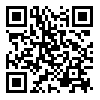Volume 6, Issue 2 (Vol6,No2(20) 2025)
2025, 6(2): 0-0 |
Back to browse issues page
Ethics code: 212215
Download citation:
BibTeX | RIS | EndNote | Medlars | ProCite | Reference Manager | RefWorks
Send citation to:



BibTeX | RIS | EndNote | Medlars | ProCite | Reference Manager | RefWorks
Send citation to:
Abtahi M, Fath Ali Beigi P, Bagherpour A. (2025). The Impact of Storytelling-Based Therapy on Improving the Self-Efficacy of Children with Attention Deficit/Hyperactivity Disorder (ADHD). Journal of Childhood Health and Education. 6(2),
URL: http://jeche.ir/article-1-320-en.html
URL: http://jeche.ir/article-1-320-en.html
1- Islamic Azad University
Abstract: (314 Views)
Introduction: This research was conducted with the objective of examining the effectiveness of therapy based on a storytelling training package in increasing the self-efficacy of children with Attention Deficit/Hyperactivity Disorder (ADHD).
Research Method: The semi-experimental research method was carried out with a pre-test and post-test design, involving experimental and control groups. The statistical population included children with ADHD who had visited the Farabi Research Counseling Center in District 12 of Tehran in the year 2022. In this study, 20 children aged 6-7 years old with ADHD were selected through convenience sampling and randomly assigned to experimental and control groups. The experimental group received therapy based on the storytelling training package in eight 75-minute sessions, twice a week. The questionnaire used in this research included the Sherer's self-efficacy scale, which has 17 items, each with five options. For the analysis of the research data, in addition to descriptive analysis, inferential analysis and the method of covariance analysis were used, utilizing SPSS software version 23.
Results: The research results indicated that the storytelling method has a positive and significant effect on improving the attention deficit and hyperactivity of children
Discussion: Based on the overall results, it can be said that therapy based on storytelling is effective in increasing the self-efficacy of children with ADHD.
Research Method: The semi-experimental research method was carried out with a pre-test and post-test design, involving experimental and control groups. The statistical population included children with ADHD who had visited the Farabi Research Counseling Center in District 12 of Tehran in the year 2022. In this study, 20 children aged 6-7 years old with ADHD were selected through convenience sampling and randomly assigned to experimental and control groups. The experimental group received therapy based on the storytelling training package in eight 75-minute sessions, twice a week. The questionnaire used in this research included the Sherer's self-efficacy scale, which has 17 items, each with five options. For the analysis of the research data, in addition to descriptive analysis, inferential analysis and the method of covariance analysis were used, utilizing SPSS software version 23.
Results: The research results indicated that the storytelling method has a positive and significant effect on improving the attention deficit and hyperactivity of children
Discussion: Based on the overall results, it can be said that therapy based on storytelling is effective in increasing the self-efficacy of children with ADHD.
Type of Study: Research |
Subject:
Special
Received: 2025/02/15 | Accepted: 2025/07/1 | Published: 2025/07/1
Received: 2025/02/15 | Accepted: 2025/07/1 | Published: 2025/07/1
Send email to the article author
| Rights and permissions | |
 |
This work is licensed under a Creative Commons Attribution-NonCommercial 4.0 International License. |



